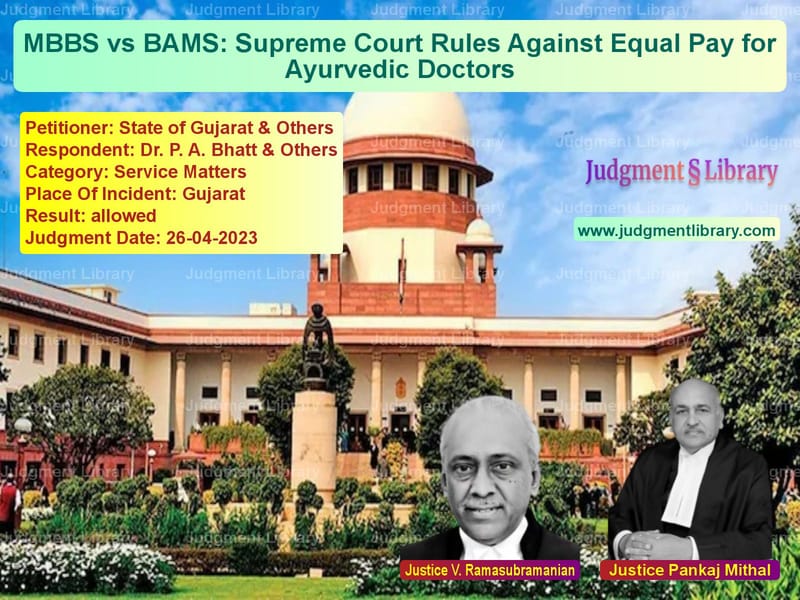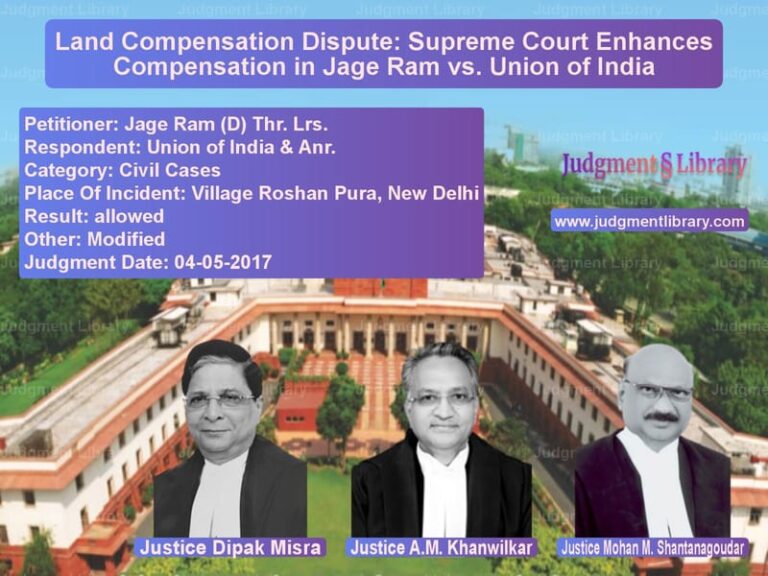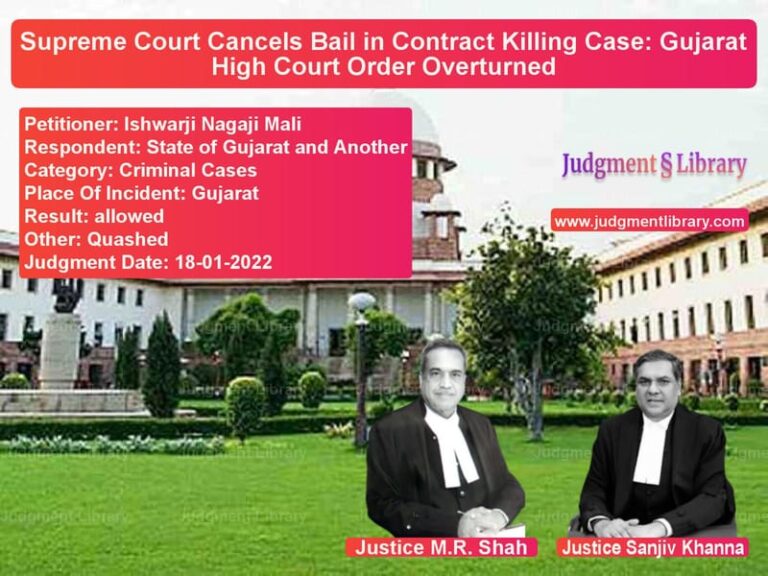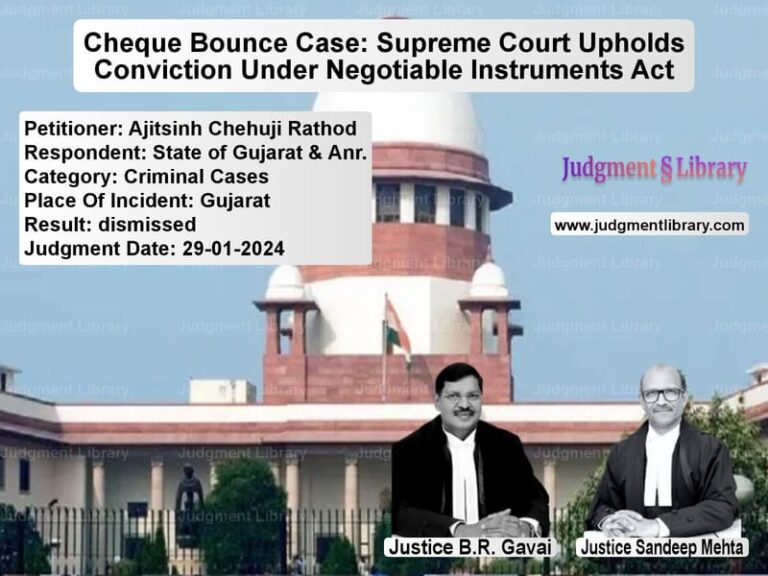MBBS vs BAMS: Supreme Court Rules Against Equal Pay for Ayurvedic Doctors
The Supreme Court of India, in the case of State of Gujarat & Others v. Dr. P.A. Bhatt & Others, ruled that Ayurvedic doctors (BAMS degree holders) are not entitled to the same pay as MBBS doctors. The Court held that the nature of work performed by both categories of doctors is not identical, and hence the principle of ‘equal pay for equal work’ does not apply.
Background of the Case
The dispute arose from a common order passed by the Gujarat High Court, which held that doctors possessing a Bachelor of Ayurvedic Medicine and Surgery (BAMS) degree should be treated at par with MBBS doctors and granted similar benefits under the Tikku Pay Commission’s recommendations.
Read also: https://judgmentlibrary.com/annual-increment-on-retirement-supreme-court-upholds-employee-rights/
The Tikku Committee was set up to improve service conditions for government doctors. It issued two reports:
- The first report (1990) applied to MBBS and specialist doctors.
- The second report (1991) applied to practitioners of Indian Systems of Medicine (Ayurveda, Unani, Siddha, Homeopathy).
The Gujarat government implemented the recommendations for MBBS doctors but initially extended similar benefits to non-MBBS doctors in 1999. However, in 2013, the state withdrew the benefits for Ayurvedic doctors, leading to a legal challenge.
Petitioner’s Arguments (State of Gujarat)
The Gujarat government, represented by its counsel, argued:
- The Tikku Committee’s recommendations were meant only for MBBS doctors, not Ayurvedic doctors.
- There was a shortage of MBBS doctors in Gujarat, necessitating better pay to attract talent, whereas Ayurvedic doctors were available in adequate numbers.
- MBBS doctors perform duties that Ayurvedic doctors cannot, such as trauma care, emergency medicine, surgery, and post-mortems.
- The principle of equal pay for equal work does not apply as Ayurvedic doctors and MBBS doctors do not perform identical duties.
Respondent’s Arguments (Ayurvedic Doctors)
The Ayurvedic doctors argued:
- Both MBBS and BAMS doctors serve in the same government cadre as Medical Officers (Class-II).
- They work in Primary Health Centers (PHCs) and Community Health Centers (CHCs), often managing them independently.
- The government initially extended equal benefits to them but later withdrew them arbitrarily.
- Under Article 14 (Equality before Law), discrimination based on qualification within the same cadre was unconstitutional.
Key Legal Issues
The Supreme Court examined two critical legal questions:
- Can different pay scales be fixed for employees within the same cadre based on educational qualifications?
- Do MBBS and BAMS doctors perform “equal work” justifying “equal pay”?
Supreme Court’s Observations
The Court ruled in favor of the Gujarat government, stating:
- “Classification based on educational qualification is valid and does not violate Article 14.”
- “MBBS doctors perform duties that Ayurvedic doctors are not trained to do, such as surgery, trauma care, and emergency medical procedures.”
- “The principle of equal pay for equal work applies only when the nature of work, responsibilities, and skills required are identical.”
- “The withdrawal of benefits was justified as the original Tikku Committee recommendations applied only to MBBS doctors.”
The Court cited precedents such as:
- The State of Mysore v. P. Narasinga Rao (1968) – Justifying classification based on qualification.
- Mewa Ram Kanojia v. AIIMS (1989) – Holding that educational qualification can justify different pay scales.
- Shyam Babu Verma v. Union of India (1994) – Confirming that qualification-based pay differences are valid.
Final Judgment
The Supreme Court allowed the appeals, setting aside the Gujarat High Court order. It ruled:
“There is a clear difference in qualifications, duties, and responsibilities of MBBS and BAMS doctors. The decision to grant different pay scales is legally justified.”
The Court also directed the recovery of benefits erroneously granted to Ayurvedic doctors due to interim orders.
Impact and Legal Significance
- Reaffirms that pay scales can be linked to qualifications.
- Limits the scope of “equal pay for equal work.”
- Confirms that government service rules can differentiate based on professional qualifications.
Conclusion
The Supreme Court’s ruling in State of Gujarat v. Dr. P.A. Bhatt clarifies that MBBS and BAMS doctors do not perform identical roles and are not entitled to equal pay. The judgment underscores the importance of qualification-based classification in public employment, ensuring that pay scales reflect the skills and responsibilities of different professionals.
Petitioner Name: State of Gujarat & Others.Respondent Name: Dr. P. A. Bhatt & Others.Judgment By: Justice V. Ramasubramanian, Justice Pankaj Mithal.Place Of Incident: Gujarat.Judgment Date: 26-04-2023.
Don’t miss out on the full details! Download the complete judgment in PDF format below and gain valuable insights instantly!
Download Judgment: state-of-gujarat-&-o-vs-dr.-p.-a.-bhatt-&-ot-supreme-court-of-india-judgment-dated-26-04-2023.pdf
Directly Download Judgment: Directly download this Judgment
See all petitions in Public Sector Employees
See all petitions in Employment Disputes
See all petitions in Pension and Gratuity
See all petitions in Judgment by V. Ramasubramanian
See all petitions in Judgment by Pankaj Mithal
See all petitions in allowed
See all petitions in supreme court of India judgments April 2023
See all petitions in 2023 judgments
See all posts in Service Matters Category
See all allowed petitions in Service Matters Category
See all Dismissed petitions in Service Matters Category
See all partially allowed petitions in Service Matters Category







